Top 10 Russian economic events of 2012
.jpg)
Russian President Vladimir Putin at the APEC summit. Source: ITAR-TASS
This year's Asia-Pacific Economic Cooperation (APEC) Forum in Vladivostok came to a close on Sept. 11. In preparation for the event, around $18 billion was invested in the city's infrastructure, bringing the total investment in the summit to around $21 billion.
Russia used the occasion to signal its increasing focus on the Asia-Pacific region: "More than 50 percent of our trade is still with the European Union, but we must realize that, if we set ourselves the task of diversifying the economy to make it stronger and less reliant on raw materials, the balance needs to shift.
At least 50 percent of our foreign trade should be with the Asia-Pacific region," said Deputy Prime Minister Igor Shuvalov. In Shuvalov’s view, the potential for trade and investment cooperation with countries such as China, Japan, South Korea, and the United States is less than 25 percent realized. Following the meeting of APEC foreign and trade ministers, Russia received 35 proposals to set up free trade areas, including ones from China and India.
Russia reaches top 50 in Bloomberg ranking
.jpg)
Improving the investment climate in Russia is a gradual process, experts believe. Source: Reuters / Voctock Photo
According to the most recent "Bloomberg Best Countries for Business" ranking released in April 2012, Russia is among the top 50 countries with favorable investment climates. The ranking, which measures conditions for attracting foreign investment, put Russia in 48th place out of 160 countries analyzed.
The country pushed ahead of its BRICS colleagues India and Brazil, which took 49th and 50th place, respectively. The survey took into account numerous economic indicators — from the degree of economic integration and the cost of setting up a new business, to the cost of labor and materials and the readiness of local consumers.
“Improving the investment climate in the country is a gradual process and it may take several years,” said Fedor Naumov, head of the research at the Moscow-based Kapital Asset Management LCC. “Nevertheless, there are some positive signs for improvements. Russian banks and some companies pledged to follow Western standards of doing business,” he said.

Facebook raised $6.84 billion in the IPO, and its shareholders cashed out $9.16 billion. Source: Alamy / Legion Media
On May, 22, 2012, Russian investment group DST, run by Yury Milner of Mail.ru, became the second-largest seller of Facebook shares in the social-media company’s IPO. DST raised a total of $1.73 billion and has been left with a $3.23 billion stake, based on the current offering price.
Facebook raised $6.84 billion in the IPO, and its shareholders cashed out $9.16 billion. Accel Partners became the largest seller, raising $1.86 billion. DST still controls 4 percent of Facebook’s total stocks and 5.2 percent of its voting shares. Mail.ru Group, created and owned by Milner and currently controlled by Usmanov, sold $740 million worth of Facebook shares. The company has an estimated $1.4 billion stake, equivalent to 1.7 percent of the total stock and 2.4 percent of the voting shares.
{***}
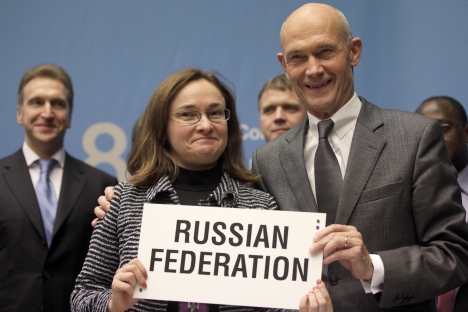
Russia became a full-fledged member of the WTO in 2012. Source: Reuters / Vostock Photo
On August 22, 2012, at 12:00 a.m. Geneva time (2:00 a.m. Moscow time), Russia officially became the 156th member of the World Trade Organization. The process took almost 19 years. Russia is the last major world economy to join the WTO.
Experts say it could be seven years before the country's market is fully adapted, so it is too early to draw conclusions on the pros and cons for Russia and the world community as a whole. However, most experts believe that, under the circumstances, WTO accession by itself will not galvanize the economy.
The groundwork should have been prepared in advance, including steps to create a level playing field and frame the necessary legislation. Now, however, it will require a year or two to draft the legislation, during which time Russian companies will lose ground in the global market.
"Even without the WTO, the situation doesn't look good for domestic producers. It's like putting a ballerina in the ring with a heavyweight fighter," said Vyacheslav Pronin, deputy director of the WTO-Inform analytical center.
Sollers makes Mazdas in Vladivostok
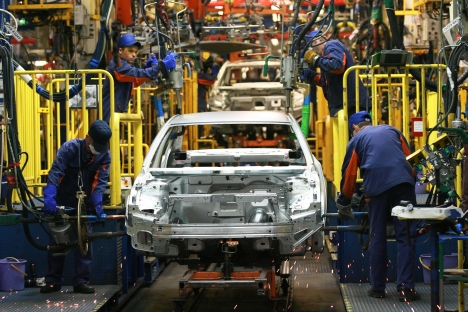
A Sollers plant in Vladivostok. Source: ITAR-TASS
On September 6, 2012, Russian automaker Sollers launched a joint venture with Japan's Mazda to build cars in Russia's Far East. The opening ceremony of the new Sollers plant in Vladivostok, where the cars will be made, was attended by President Vladimir Putin.
"I welcome the fact that Mazda chose Russia as the location for its first plant abroad. Projects of this kind are of great importance not only for Russia's economy but for the entire region. I am pleased that such projects are being carried out with our traditional trading partners; there is no doubt that they are mutually beneficial," said Putin.
The Russian leader was joined at the ceremony by Mazda president Takashi Yamanouchi, who said that assembly of the Mazda CX-5 off-roader would begin at the plant within a month, followed by production of the Mazda 6 sedan, which would begin in 2013. Production capacity at the plant is currently limited to 50,000 cars per year, but Sollers hopes to increase that figure to 100,000, on the back of overall investments worth 10 billion rubles ($32 million).
Sberbank goes through privatization
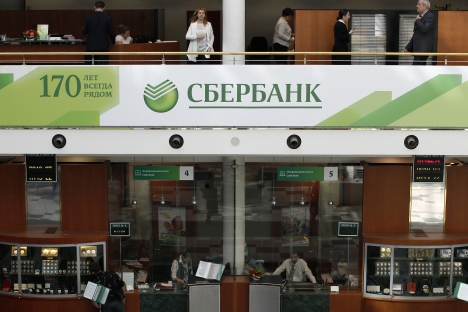
Russia's largest state-owned bank Sberbank. Source: Getty Images / Fotobank
On Sept. 20, 2012, the Bank of Russia sold 7.6 percent Sberbank stock for $5.2 billion, in an effort to stimulate a positive flow of capital into the country and encourage more issuers to place shares. The Sberbank stock was snatched up practically overnight. The bid book was closed on Tuesday, Oct. 2, at 2:30 p.m. London time.
First deputy chairman of the Bank of Russia, Alexei Ulyukayev, described the placement as the largest in modern economic history.
"It is rare indeed for the bid book to be subscribed three times over at the initial price in just one day, and twice over at the closing price," he said. According to Sberbank CEO German Gref, the deal attracted a very wide range of investors, including more than 10 of the largest institutional global funds — from Russia, the UK, and other countries in Europe, Asia, and the Middle East. "Most of the buyers had not invested in Sberbank or Russia before," Gref said.
{***}
Second branch of Nord Stream launched
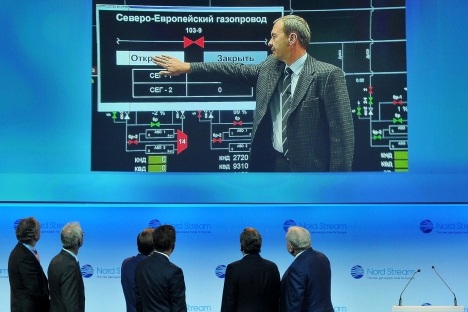
The launch of the Nord Stream second branch. Source: RIA Novosti / Alexey Kudenko
On October 8, 2012, Russian gas giant Gazprom opened the second branch of the Nord Stream gas pipeline toward Europe, doubling its capacity to up to 55 billion cubic meters (1.9 trillion cubic feet) a year. The first phase went online on November 8, 2011. Nord Stream allows Russian gas direct access to Europe via a 750-mile-long pipeline under the Baltic Sea.
The pipeline begins at the Russian city of Vyborg and ends at Greifswald in Germany. Before the pipeline was built, Russian gas had to travel to Europe via one of two routes: through Belarus and Poland, or through Ukraine and Slovakia. Nord Stream's shareholders are Gazprom (51 percent), Germany's Wintershall Holding and E.ON Ruhrgas (15.5 percent each), France's GDF Suez, and the Netherlands' Gasunie (9 percent each).
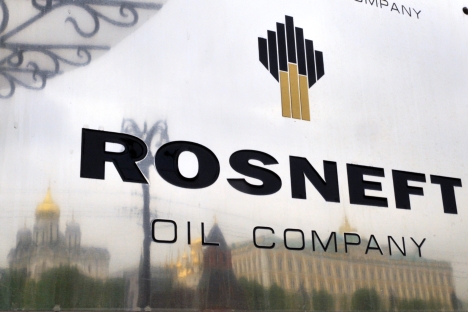
In December 2012, Rosneft signed a contract with the AAR Consortium on the purchase of its 50 percent of TNK-BP. Source: AFP / East-News
On October 22, 2012, Russia's state-owned oil giant Rosneft announced its intention to buy a 100 percent stake in TNK-BP from AAR Consortium (Alfa Group, Access Industries, Renova) and Britain's BP. The deal is worth a total of $61 billion. In the first step of the deal, BP sold its 50 percent stake to Rosneft for $17.1 billion in cash, plus a 12.84 percent slice of Rosneft stock.
Then, BP used $4.8 billion of the proceeds to acquire an additional 5.66 percent stake in Rosneft from the Russian government at $8 per share (with a premium of 12 percent to Rosneft's share price at the moment trading closed on the day the application was filed). As a result of the deal, BP became the second largest shareholder in Rosneft, after the Kremlin.
In December 2012, Rosneft signed a contract with the AAR Consortium on the purchase of its 50 percent of TNK-BP. The deal was valued at $28 billion.
Rosneft's 100 percent acquisition of TNK-BP is due to close in the first half of 2013. In assessing the deal, TNK-BP Executive Director German Khan said: "A deal of this magnitude has never been made in Russia before, and the very fact of its conclusion points to the growing capacity of the domestic economy and Russia's leading role in the global oil and gas industry."
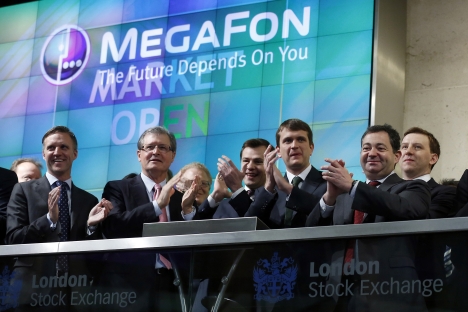
MegaFon launches its IPO in London. Source: Getty Images / Fotobank
On November 28, 2012, MegaFon (one of Russia’s top three mobile operators) issued an IPO on the London Stock Exchange. The company raised $1.7 billion, posting 15.2 percent of its stock at $20 per share. Most of the shares were bought by American and British investors, with Russian players making up no more than 10 percent of the bids.
Investors in the IPO valued MegaFon at $11.1 billion. Prior to exercise of the over-allotment option, 15.2 percent of the company's share capital will remain in free float. One half of the proceeds will go toward servicing or refinancing the company's debt, while the other will go toward developing and expanding its network.
MegaFon's shareholders reaped $1.7 billion from the IPO and could earn a further $200 million from exercising the over-allotment option, according to a source for RBC daily in the financial market.
Yandex and Sberbank Announce Joint Venture for Electronic-Money Solutions
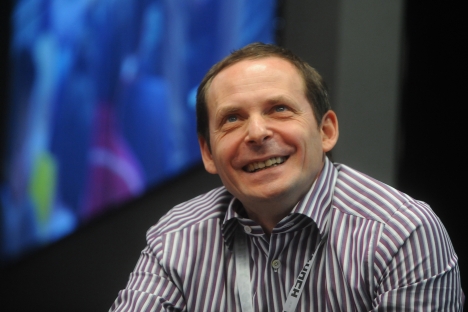
Yandex CEO Arkady Volozh. Source: ITAR-TASS
On Decemeber 19, 2012, Sberbank announced the establishment of a joint venture with Russian Internet giant Yandex in Yandex’s e-money platform, Yandex.Money. To form the joint venture, Sberbank will acquire a 75 percent interest in the charter capital of Yandex.Money for $60 million, with Yandex retaining a blocking interest in the joint venture (25 percent + 1 ruble).
“Expanding our presence in the digital world and developing online solutions is one of our operational priorities. In Yandex, we have found the optimal partner to significantly strengthen our position in the fast growing market of electronic commerce and Internet payments,” said Sberbank CEO German Gref.
This article was prepared using materials from Ria Novosti, RBC Daily, American Voice (Russia) and Vostok-media.
All rights reserved by Rossiyskaya Gazeta.
Subscribe
to our newsletter!
Get the week's best stories straight to your inbox